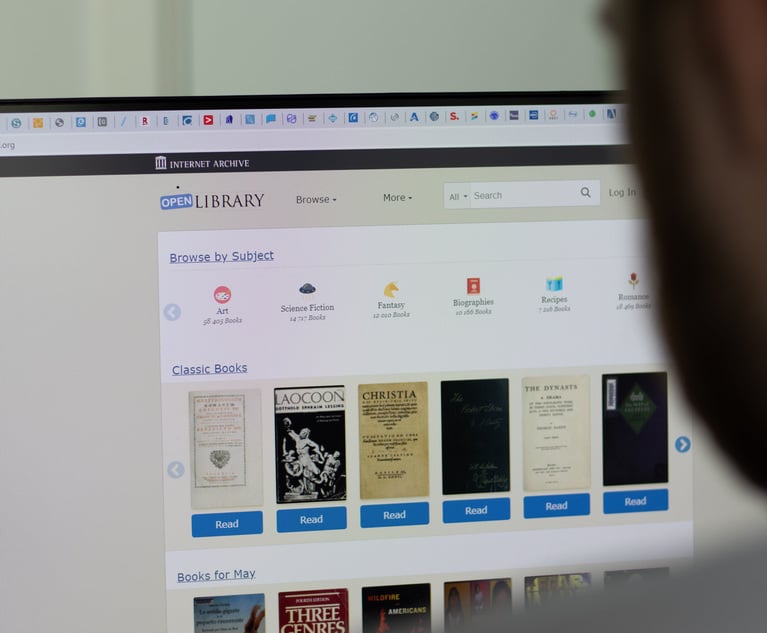 Credit: BGStock72/Adobe Stock
Credit: BGStock72/Adobe Stock Halston: A Lesson in Licensing
A healthy licensing program, carefully curated by responsible brand owners, can elevate a brand to a formidable multihyphenate while anchoring it through the fickle winds of retail.
August 26, 2022 at 01:55 PM
8 minute read
"Am I businessman or an artist?" asks American designer Roy Halston Frowick (Ewan McGregor, who, for his performance, won the 2021 Primetime Emmy Award for Outstanding Lead Actor in a Limited Series or Movie), in the 2021 Netflix series, "Halston." Titled after its subject, Frowick is better known mononymously as Halston. "Why not both?" retorts American publicist and "Empress of Seventh Avenue," Eleanor Lambert (Kelly Bishop). It is in this second episode ("Versailles") that Lambert expertly navigates Halston to resolution of his identity crisis with an introduction to David J. Mahoney (Bill Pullman), chairman of Norton Simon, a consumer products conglomerate in search of "magic." To successfully tempt the one-time milliner to sell his namesake to Norton Simon, Mahoney not only offers panacea to the myriad issues facing the fledgling fashion house, but the promise of glory. "I will make you so intrinsic to American culture that nobody will remember a time when there wasn't Halston." It is in the penultimate episode of the series ("The Party's Over"), when Joe Eula (David Pittu), creative director at Halston, declares, "Halston's name is on everything, loungewear, furniture, luggage, linens—wigs for God's sake!" that the audience can fully appreciate just how Mahoney made good on his promise to convert Halston from pronoun to noun. In a word—licensing.
Licensing? The concept is simple enough. On one hand is the celebrated brand (licensor), whose identity—its most valuable resource—is host to limitless merchandising opportunities. On the other hand is the manufacturer (licensee), who, having recognized the possibilities, is willing to fashion the brand's name and logo (intellectual property) on any manner of consumer products. The licensor may then lease its intellectual property to the licensee for a predetermined term in a defined territory, in exchange for a royalty on sales of the product developed by the licensee and approved by the licensor for distribution and sale. All such terms are carefully articulated, and each parties' respective obligations formalized in a license agreement. When drafted by a non-adversarial attorney that is not just a mitigator of risk, but a pragmatic business partner, such an agreement will establish reasonable expectations for many variables, not limited to the product's aesthetics and quality, or the merchandising and marketing strategies of the license. The marriage between the licensing parties must then be properly tended, and upon continued commitment to each other in accordance with the terms negotiated and agreed, there is opportunistic growth.
This content has been archived. It is available through our partners, LexisNexis® and Bloomberg Law.
To view this content, please continue to their sites.
Not a Lexis Subscriber?
Subscribe Now
Not a Bloomberg Law Subscriber?
Subscribe Now
NOT FOR REPRINT
© 2025 ALM Global, LLC, All Rights Reserved. Request academic re-use from www.copyright.com. All other uses, submit a request to [email protected]. For more information visit Asset & Logo Licensing.
You Might Like
View All
IP at the Frontier of AI: Navigating the New Landscape


Not All Secrets Are Trade Secrets: SDNY Examines the Limits of NDA Protection
13 minute read
'Rampant Piracy': US Record Labels File Copyright Suit Against French Distributor Believe
5 minute readTrending Stories
- 1'Not the President's Personal Lawyer': Lawyers Share Concerns Over How AG Pick Bondi’s Loyalism to Trump May Impact DOJ
- 2US Judge OKs Partial Release of Ex-Special Counsel's Final Report in Election Case
- 3The Demise of Truth and Transparency in Federal Sentencing
- 4Former Phila. Solicitor Sozi Tulante Rejoins Dechert
- 5'I've Seen Terrible Things': Lawyer Predicts Spike in Hazing Suits
Who Got The Work
Michael G. Bongiorno, Andrew Scott Dulberg and Elizabeth E. Driscoll from Wilmer Cutler Pickering Hale and Dorr have stepped in to represent Symbotic Inc., an A.I.-enabled technology platform that focuses on increasing supply chain efficiency, and other defendants in a pending shareholder derivative lawsuit. The case, filed Oct. 2 in Massachusetts District Court by the Brown Law Firm on behalf of Stephen Austen, accuses certain officers and directors of misleading investors in regard to Symbotic's potential for margin growth by failing to disclose that the company was not equipped to timely deploy its systems or manage expenses through project delays. The case, assigned to U.S. District Judge Nathaniel M. Gorton, is 1:24-cv-12522, Austen v. Cohen et al.
Who Got The Work
Edmund Polubinski and Marie Killmond of Davis Polk & Wardwell have entered appearances for data platform software development company MongoDB and other defendants in a pending shareholder derivative lawsuit. The action, filed Oct. 7 in New York Southern District Court by the Brown Law Firm, accuses the company's directors and/or officers of falsely expressing confidence in the company’s restructuring of its sales incentive plan and downplaying the severity of decreases in its upfront commitments. The case is 1:24-cv-07594, Roy v. Ittycheria et al.
Who Got The Work
Amy O. Bruchs and Kurt F. Ellison of Michael Best & Friedrich have entered appearances for Epic Systems Corp. in a pending employment discrimination lawsuit. The suit was filed Sept. 7 in Wisconsin Western District Court by Levine Eisberner LLC and Siri & Glimstad on behalf of a project manager who claims that he was wrongfully terminated after applying for a religious exemption to the defendant's COVID-19 vaccine mandate. The case, assigned to U.S. Magistrate Judge Anita Marie Boor, is 3:24-cv-00630, Secker, Nathan v. Epic Systems Corporation.
Who Got The Work
David X. Sullivan, Thomas J. Finn and Gregory A. Hall from McCarter & English have entered appearances for Sunrun Installation Services in a pending civil rights lawsuit. The complaint was filed Sept. 4 in Connecticut District Court by attorney Robert M. Berke on behalf of former employee George Edward Steins, who was arrested and charged with employing an unregistered home improvement salesperson. The complaint alleges that had Sunrun informed the Connecticut Department of Consumer Protection that the plaintiff's employment had ended in 2017 and that he no longer held Sunrun's home improvement contractor license, he would not have been hit with charges, which were dismissed in May 2024. The case, assigned to U.S. District Judge Jeffrey A. Meyer, is 3:24-cv-01423, Steins v. Sunrun, Inc. et al.
Who Got The Work
Greenberg Traurig shareholder Joshua L. Raskin has entered an appearance for boohoo.com UK Ltd. in a pending patent infringement lawsuit. The suit, filed Sept. 3 in Texas Eastern District Court by Rozier Hardt McDonough on behalf of Alto Dynamics, asserts five patents related to an online shopping platform. The case, assigned to U.S. District Judge Rodney Gilstrap, is 2:24-cv-00719, Alto Dynamics, LLC v. boohoo.com UK Limited.
Featured Firms
Law Offices of Gary Martin Hays & Associates, P.C.
(470) 294-1674
Law Offices of Mark E. Salomone
(857) 444-6468
Smith & Hassler
(713) 739-1250






